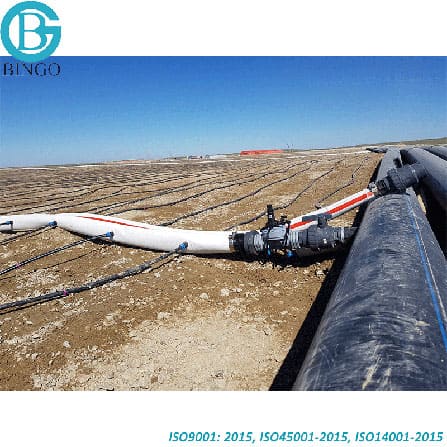Understanding the Trick Benefits of HDPE Pipeline for Water and Wastewater Monitoring
Using HDPE pipe in water and wastewater management presents numerous benefits that merit consideration. Its phenomenal durability and lengthy life expectancy make it a preferred option for lots of jobs. Additionally, the product's resistance to rust and chemical damages improves its integrity in different environments. The advantages prolong past just long life and resistance. American Plastics HDPE Pipe Manufacturing. Exploring its cost-effectiveness and environmental influence reveals much more compelling factors for its prevalent fostering in modern facilities
Extraordinary Toughness and Longevity

HDPE pipe stands out for its extraordinary resilience and durability, making it a recommended selection in water monitoring systems. Built from high-density polyethylene, these pipelines can withstand significant pressure and stress, making sure trustworthy efficiency with time. Their durable nature permits them to sustain severe ecological problems, consisting of temperature level changes and dirt motions, which can trigger other materials to fail.
The life expectancy of HDPE pipes typically surpasses 50 years, providing an affordable solution for municipalities and industries alike. In addition, the product's lightweight buildings streamline installation, decreasing labor costs and durations. This longevity lessens the requirement for frequent fixings or replacements, even more enhancing its financial appeal.
In water monitoring applications, the integrity of HDPE pipes suggests fewer disruptions and improved solution connection, making them important to sustainable framework advancement. The mix of resilience and long life strengthens HDPE's role as a keystone in effective water monitoring services.

Resistance to Corrosion and Chemical Damages
While many materials give in to rust and chemical damages over time, HDPE pipes show amazing resistance, making them optimal for various water administration applications. This durability originates from the molecular structure of high-density polyethylene, which is inherently non-reactive and does not rust like steels or weaken from exposure to severe chemicals. Therefore, HDPE is very effective in atmospheres with hostile materials, such as wastewater systems that might contain acids, bases, and organic solvents.
Additionally, HDPE pipelines can endure environmental aspects such as dirt level of acidity and saline problems, better enhancing their viability for varied applications (custom hdpe pipe manufacturing Midland TX). Their capability to preserve architectural stability gradually minimizes the threat of leaks and failings, which is essential in guaranteeing the security and reliability of water circulation and wastewater monitoring systems. Subsequently, the resistance to deterioration and chemical damages substantially adds to the general effectiveness and long life of HDPE piping options
Cost-Effectiveness and Financial Advantages
When thinking about the financial effects of water administration systems, the cost-effectiveness of HDPE pipes comes to be apparent. These pipelines use reduced setup and maintenance article source prices contrasted to typical products like metal or concrete. Their lightweight nature streamlines transportation and installment, leading to lowered labor costs. Additionally, HDPE pipes exhibit a lengthy lifespan, often going beyond 50 years, which converts to fewer substitutes and long-term financial savings.
Furthermore, the resistance of HDPE to deterioration and chemical damage minimizes the requirement for costly repair services and replacements. The pipes additionally support effective water circulation, decreasing energy prices related to pumping systems. By alleviating leakages and water loss, HDPE pipelines add to considerable financial benefits for communities and sectors alike. Generally, the initial financial investment in HDPE piping can generate significant financial returns over the lifespan of the water administration system, making it a prudent Source option for lasting facilities growth.
Ecological Sustainability and Lowered Influence

Versatility and Adaptability in Setup
As a result of their one-of-a-kind properties, HDPE pipelines use exceptional adaptability and flexibility in installment, making them appropriate for a broad array of applications. Their light-weight nature permits for simpler handling and transportation, lowering labor expenses and installation time. HDPE pipes can be bent and shaped to fit different surfaces and job demands, which is particularly beneficial in challenging settings.
Furthermore, their resistance to rust and chemical damages enables installation in diverse setups without the demand for specialized protective finishes. The ability to fuse joints produces a continual, leak-free system, boosting the general honesty and integrity of the installation. HDPE's versatility additionally accommodates ground motion, lowering the danger of damages in locations prone to shifting dirt. On the whole, these characteristics make HDPE pipes not just versatile however additionally a preferred selection for water and wastewater administration systems.
Regularly Asked Inquiries
How Does HDPE Pipeline Contrast to PVC in Water Monitoring Applications?
HDPE pipe provides premium flexibility, resistance to corrosion, and toughness contrasted to PVC. Its lighter weight promotes less complicated installation, while its lengthy life expectancy reduces substitute prices, making HDPE a recommended selection in water administration applications.
What Is the Life Expectancy of HDPE Water Lines Under Normal Conditions?
Under regular problems, HDPE pipelines can have a life expectancy varying from 50 to 100 years. Their longevity and resistance to corrosion add to their lasting efficiency in different applications, making them a reliable option for facilities.
Are HDPE Pipeline Recyclable After Their Life Span?
Yes, HDPE pipelines are recyclable after their life span. American Plastics HDPE Pipe Manufacturing. They can be processed and repurposed right into brand-new products, greatly lowering environmental impact and advertising sustainability within the industry, making them an eco-friendly selection for piping services
What Is the Setup Refine for HDPE Pipeline?
The installment procedure for HDPE pipes includes site prep work, trenching, pipe combination or mechanical signing up with, backfilling, and pressure screening. Appropriate techniques ensure a durable and efficient system for carrying water and wastewater successfully.
Can HDPE Pipes Be Utilized for Both Safe And Clean and Non-Potable Water Systems?
Yes, HDPE pipelines can be utilized for both safe and clean and non-potable water systems. Their adaptability, toughness, and resistance to corrosion make them appropriate for numerous applications, ensuring risk-free and effective transportation of water in various contexts.